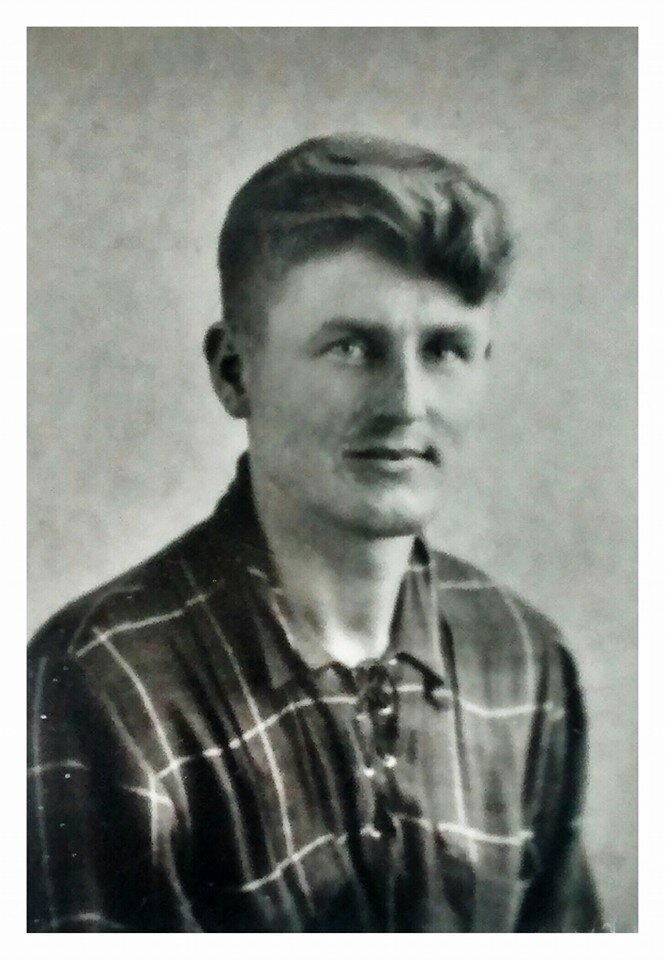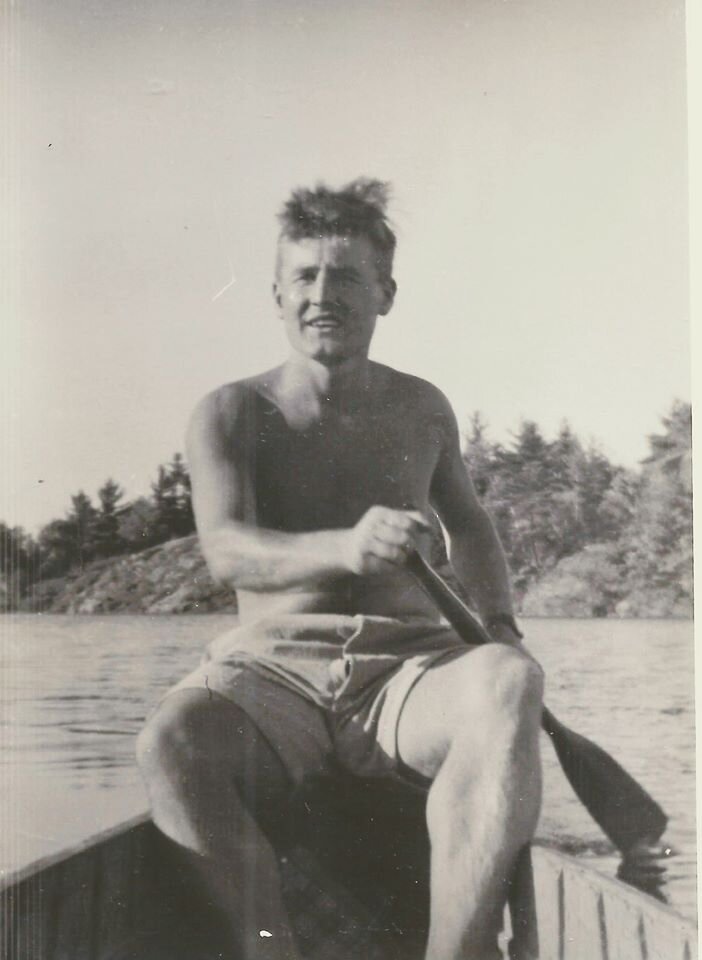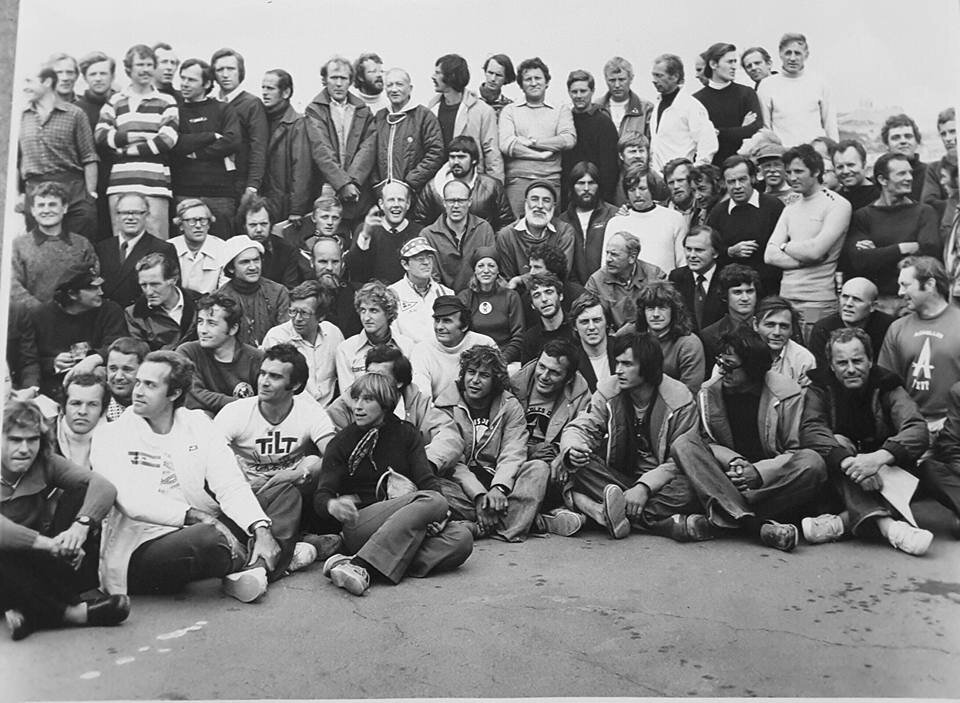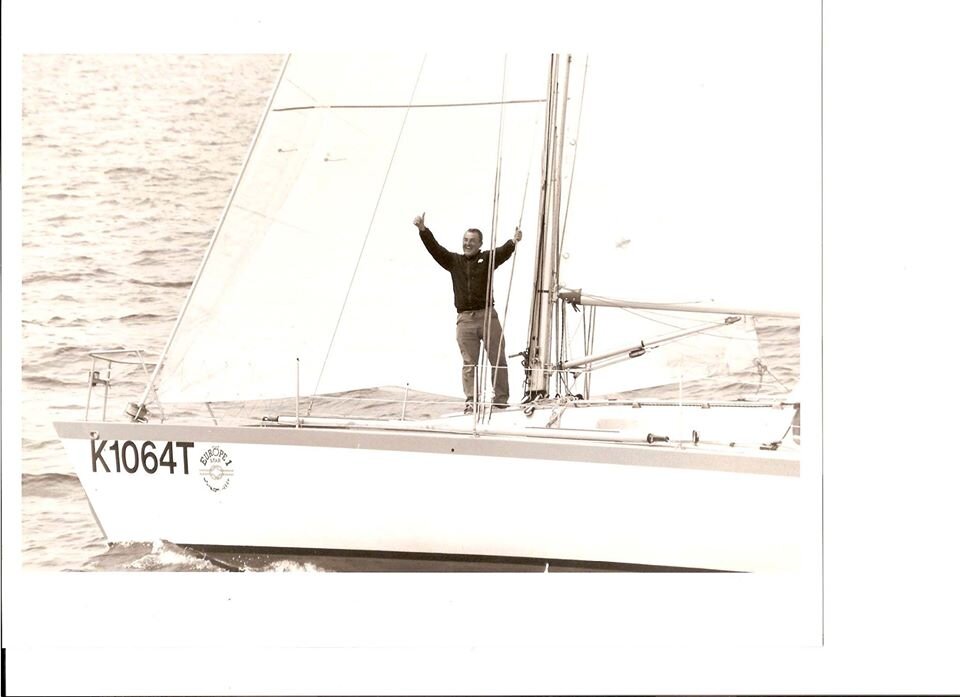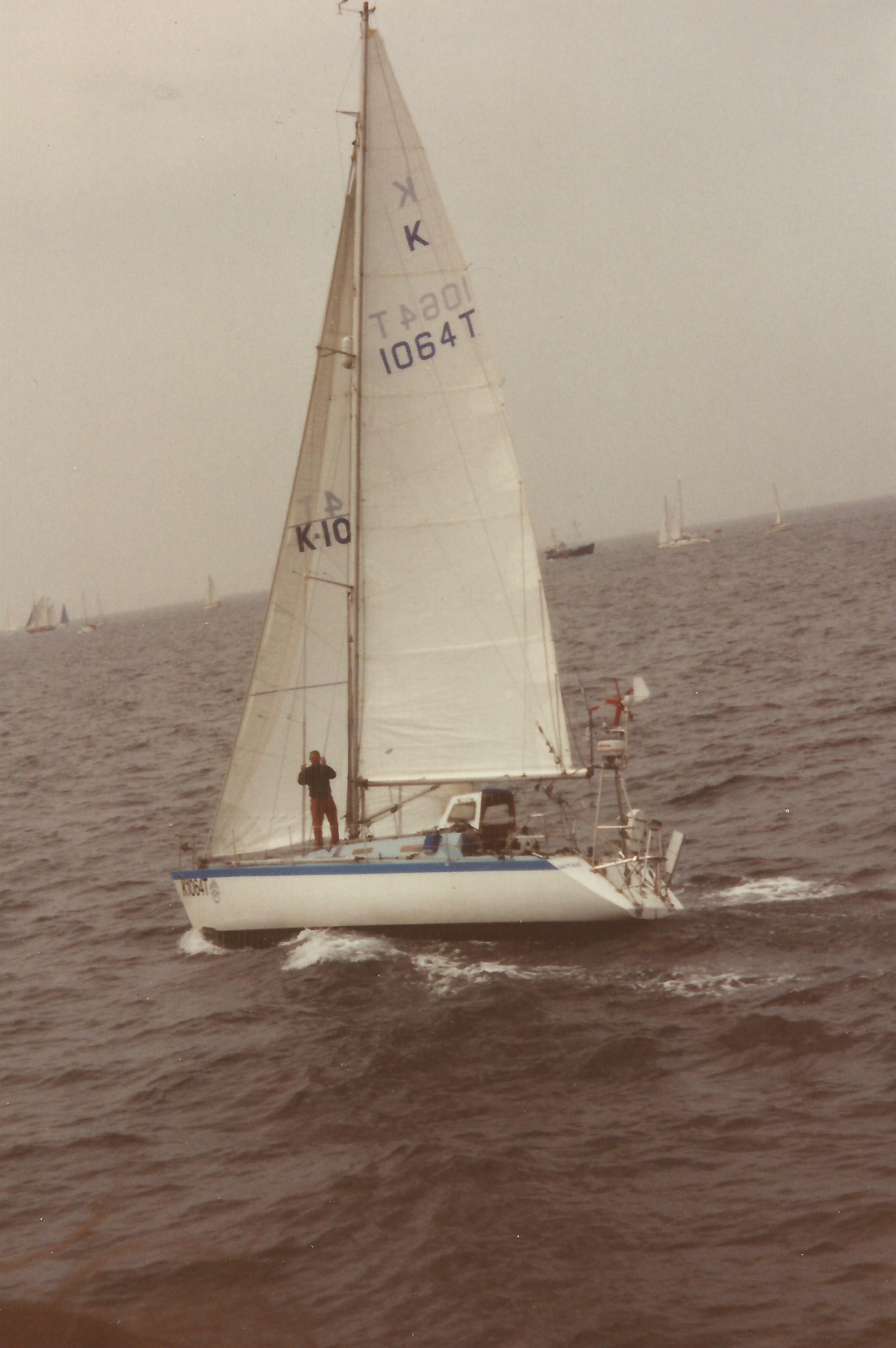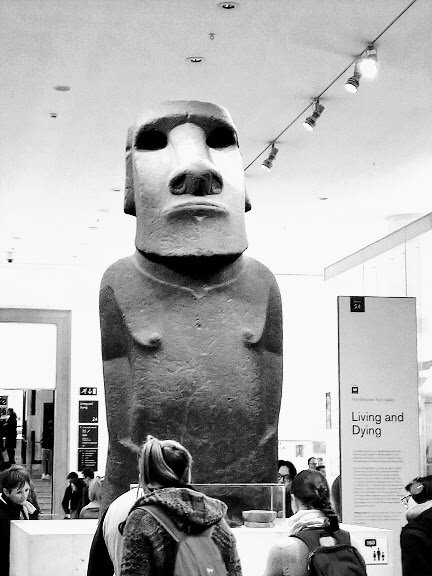Henry Hornblower - Hell's Angel of the Sea
56 degrees, 35 min South; 114 degrees 20 min West
On 02 March 1995, the emergency beacon of Henry Hornblower, a 40 foot yacht, was activated 1500 miles west of Cape Horn, and 2000 miles south of Rapa Nui. The wind was a fierce 70 knots, and the waves were as tall as three storey houses. These were diabolically awful seas for an old man in a small boat, in the cold desolate reaches of the South Pacific. Some say Harry Mitchell was a Hell’s Angel of the sea, who rode the salty storm with the determined grit of a buccaneer.
Tangaroa, the great sea god of Maori and Polynesian myth had come for Harry. Tangaroa’s hair in tangled waves crashed over the bow of Hornblower, as he battled his brother Tāwhirimātea, the god of storms. Just as Harry had battled his own brother in this world. The boat turned over and would not right itself. Tangaroa shifted into his whale form and as Harry sank below the surface, the great whale’s back caught his spirit to take him to the bottom of that deep, deep ocean.
Down into the blackness where light can not pierce, where strange luminous creatures drift, impervious to the cold, there Tangaroa placed Harry on the sea bed.
“I am whale because you are also whale,” Tangaroa told the old man.
“Your daughter is also whale, and you must pass whale spirit on to her now. You will swim 10,000 miles back to your homeland to gift whale to her, just as sailors will now gift you the gold earring which you sought for so long. Bring her your whale’s tooth, she will know what to do with it. She is ready now, just as you are ready to say sorry.
“Before you begin the long journey home, you must swim to Rapa Nui. There you will listen to the song of the stones, and the songs of the ancestors. You will listen to their people and what they ask for, and you will carry their songs back to your daughter.”
So Harry became whale and swam to Rapa Nui, where he heard the people tell the story of King Tangaroa arriving on the island, a long time before.
Then he began the deep voyage home. Past Cape Horn where he found the gold earrings those buccaneer sailors had thrown to him as they sailed that dangerous passage. He was encouraged by their remembering, so he carried on swimming. With his whale spirit sight he saw his wife grow old. He was sorry for all the times he’d made her sad. He was sorry too for how he had driven his children from his kingdom, for being such a fierce Hell’s Angel of the sea, filling them with fear and anger. A volcano erupting out of the boiling waters. He saw his family get sick as they battled with his demons. He wanted to protect them. But he could only swim with the currents, where he felt the waters getting warmer as the oceans filled with plastic, and the sonic sounds of whales dying because their bellies were full of poison.
Many years passed, he kept on swimming the thousands of miles back to shore. Until one day, after his wife had died, he saw his youngest daughter floating on the waves in a five pointed star. He swam beneath her and lifted her out of the sea onto his back.
“Here is the old whale’s tooth, with it’s two women carved by an old, old hunter. It belongs to you now. You fought to save the whales when you were young. This is part of your medicine. I give you your whale spirit who is always here to protect you. I am sorry too, for all the tests I put you through. For all the times I made you cry. They were the toughest of initiations, but now you are free to float on the water, as a queen of the sea. It is time to sail into your sovereignty. I stand behind you, as all your ancestors now stand behind you. You can hear their songs down through the centuries. You know how to remember, you know how to sing their stories. In two years you will be ready to listen to the great Moai, because of your remembering.”
His youngest daughter wept and felt glad to know her father had swum 10,000 miles, because he had felt so very far away for so very long. She wept because she missed her mother; now her father had returned, and they could sit side by side on the great granite stone at the mouth of the harbour. Then she leapt into the future, to the 29 February 2020, where she found herself standing in front of the giant Moai, Hoa Hakananai’a. As people crowded around, pushing to take selfies but not really stopping, she stared into his black basalt eyes, and heard his sadness and his longing to go home. She knew it was time for whale to come, to swim up the Thames into the flooded land; for Tangaroa, in his shape shifting form, to take the Moai to the Naval of the World, back home where he belonged.
Tangaroa, the breaking wave that broke her father’s bones, but who, in turn, had carried him home to her. She remembered that her father had been lost for 25 years, but in this alchemical mythic process, he had brought her stories from the great Southern Ocean on his broad whale back. Harry had given her the bounty of the sea, and she was so very grateful.
The story of Tangaroa and Hiro
Tangaroa is a character that appears in several Polynesian cultures. In Rapa Nui myth he appears as a king from Hiva that reaches the land of Rapa Nui in the shape of a seal. In other myths he takes the form of a whale. He has a brother called Hiro. Both brothers have strong magical powers.
Recorded by Fritz Felbermayer; Corrected and typed in Rapa Nui by Paulus Kieviet in 2008; Translated to English by Marcus Edensky in 2013
English / Rapa Nui
King Tangaroa and his brother Hiro lived in Hiva.
'I Hiva te nohoŋa o te 'ariki ko Taŋaroa rāua tō'ona taina ko Hiro.
Both brothers had mana.
Ararua taina e ai rō 'ā te mana.
Tangaroa had a disguise of fish scales, turtle skull and seal skin.
A Taŋaroa e ai rō 'ā te nua 'ūnahi ika, pakahera honu, e kiri pakia.
Hiro put on a disguise of bird feathers.
A Hiro he uru i te nua huru-huru manu.
Both brothers were fighting fiercly every day.
Ararua taina me'e haka kē te rava tātake, te mahana te mahana.
If Tangaroa would win, the ocean would go bad.
Ana rē Taŋaroa, he rake-rake te vaikava.
The ocean got bad.
He ketu te vaikava.
Lightning was flashing, the lightning bolts were sounding.
He 'anapa te 'uira, he heruru te hatutiri.
Tangaroas power was of the ocean.
Te mana o Taŋaroa mo te vaikava.
If Hiro would win, the sky would clear up.
Mo rē o Hiro, he ma'itaki te mahana.
Hiro's power was of the land.
Te mana o Hiro mo ruŋa i te henua.
One day, Tangaroa said to Hiro:
E tahi mahana he kī Taŋaroa ki a Hiro:
I will enter the ocean as a tuna fish. I'll go to a new land to rule as a king.
He uru au ki roto i te vaikava pa he kahi. He oho au ki te henua e tahi mo 'ariki.
The brother answered:
He haka hoki atu te taina:
Don't go to a distant land, or you will die.
'Ina koe ko oho ki te henua roa 'o mate rō.
Tangaroa said: No. I will reach that land and return this very same day, if they don't like me.
He kī Taŋaroa: 'Ina. E tu'u nō ki rā henua mo oho e hoki mai 'anīrā nei 'ā, ana ta'e haŋa mai ki a au.
Hiro got mad and both brothers started fighting again.
He riri Hiro, he rake-rake haka 'ou ararua taina.
Tangaroa won.
I a Taŋaroa i rē ai.
Tangaroa entered the water and turned himself into a tuna.
He uru Taŋaroa ki roto i te vai, he haka riro pa he kahi.
He swam towards The Navel of the World.
He kau ki Te Pito o te Henua.
He reached a point where he turned into a turtle.
E oho era i tano era te roa, he haka riro pa he honu.
He continued swimming. When he reached The Navel of the World he turned into a seal.
He kau haka 'ou, i tu'u era ki Te Pito o te Henua, he haka riro pa he pakia.
He approached Hotu 'Iti and entered (the bay) in front of Ahu Tongariki.
He hāhine a Hotu 'Iti, he tomo a mu'a o te Ahu Toŋariki.
When he entered, people gathered by the edge of the ocean.
I tomo atu era, he oho mai te taŋata he taka-taka 'i te tapa o te vaikava.
A message was sent to the people of Tongariki and Poike.
He uŋa he hā'aki ki te taŋata o Toŋariki, o Pōike.
A message was sent to the people of Tongariki. The people of Orongo were called.
He uŋa he hā'aki ki te taŋata o Toŋariki, he ohu ki te taŋata o 'Ōroŋo.
The people of Tongariki said:
He kī te taŋata o Toŋariki:
A seal entered in front of ahu Tongariki. It has the body of a seal, the tail of a seal, the head of a man and hands of a man.
Ku tomo 'ā te pakia a mu'a i te ahu Toŋariki. Hakari pakia, hiku pakia, pū'oko taŋata, rima taŋata.
They dragged him onto land to kill him.
He to-toi mai ki 'uta mo tiŋa'i.
The seal shouted:
He raŋi mai te pakia:
I am not a seal. Don't kill me. I am a king called Tangaroa.
Ta'e au he pakia. 'Ina ko tiŋa'i mai. He 'ariki au ko Taŋaroa.
The people cheered: It's a seal with the voice of a man.
He vo'u te karaŋa 'i te taŋata: Pakia re'o taŋata.
They killed him with a stone and dragged him inland.
He tiŋa'i hai mā'ea, he to-toi mai ki 'uta.
They dug a great earth oven.
He keri te 'umu ko tetu.
They blew and the oven was lit up. They put the seal meat in the pit to cook it.
He puhi te 'umu, he tutu, he uru, he ta'o te kiko pakia.
The earth oven was covered with dirt.
He tanu te 'umu hai 'ō'one.
They waited for a long time before opening up the earth oven.
He tiaki ka roa te nohoŋa, he ma'oa te 'umu.
They saw that the meat was still raw of this seal.
He u'i, e ora nō 'ā te kiko o tou pakia era.
They brought it to another place and prepared an earth oven once again.
He ma'u ki te kona kē, he ta'o haka 'ou.
When they opened the earth oven they saw that the meat was almost raw. It wasn't cooked.
I ma'oa era, he u'i, re'e-re'e 'ā te kiko. 'Ina kai 'ō'otu.
The place was named Re'e.
He nape ko Re'e.
They brought it to another place to prepare it in an earth oven.
He tari haka 'ou mo ta'o 'i roto i te 'umu.
They waited until the time was right, and then uncovered the earth oven.
He tiaki ka tano rō, he ma'oa te 'umu.
They looked and saw that it had not been cooked. The meat was raw, it was not cooked.
He u'i, kai 'ō'otu, 'i-'ino te kiko, kai 'ō'otu.
The place where the earth oven was prepared was named 'Ī-'ī.
He nape ko 'Ī-'ī te kona ta'o 'umu.
They understood that they had been mistaken.
He aŋi-aŋi pē nei ē: ku hape 'ā rāua.
They said:
He kī te taŋata:
It really is clear now - he was a king. He was Tangaroa, not a seal; the meat doesn't cook.
He aŋi mau 'ā pē nei ē: he 'ariki. Ko Taŋaroa, ta'e he pakia; te kiko kai 'ō'otu.
When Tangaroa didn't reach Hiva again, Hiro came here to look for Tangaroa.
I ta'e tu'u haka 'ou era Taŋaroa ki Hiva, he oho mai Hiro kimi i a Taŋaroa.
For his long legs, he reached The Navel of the World with only sevens steps.
'I te va'e ro-roa, e hitu nō rao haŋa i tu'u rō mai ai ki Te Pito o te Henua.
When he arrived to this land he shouted:
I tu'u era ki te henua nei, he ohu:
Where is my brother Tangaroa?
¿'I hē tō'oku taina ko Taŋaroa?
The men of Tongariki, Poike and Orongo hid.
He kio te taŋata o Toŋariki, te taŋata o Pōike, te taŋata o 'Ōroŋo.
He put one foot on the land.
He rao e tahi va'e a ruŋa i te henua.
He was leaving the Navel of the World.
He oho rō 'ai mai Te Pito o te Henua.
He was so big that when he put his foot on the ground, his head blocked the sun.
He taŋata nui-nui, te va'e 'i ruŋa i te henua 'ā, te pū'oko ku poā 'ā ki te raŋi.
He looked for his brother, he left and never came back.
He kimi he oho i te tō'ona taina, kai
Harry beached by Tangaroa in New Zealand

